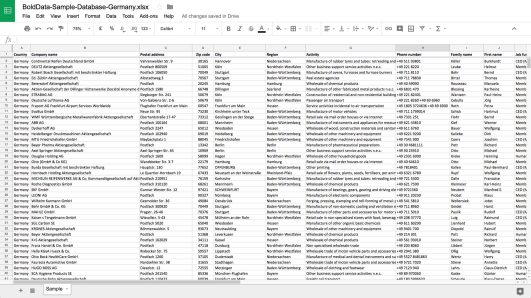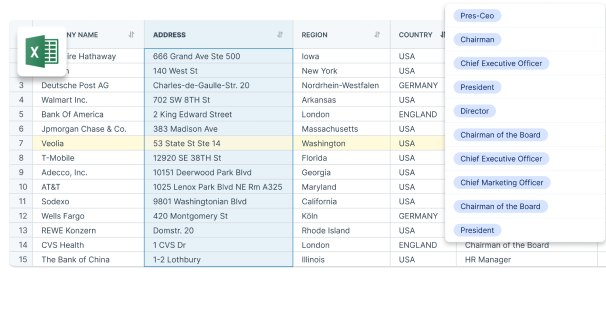Why Clean Data Remains Critical for Marketing Success in 2025
The Importance of Clean Data in Modern Marketing
Clean data means information that is accurate, up-to-date, and free from duplicates or errors. For marketers in 2025, clean data is the backbone of every successful campaign. It drives precise audience targeting, sharpens personalization, and strengthens decision-making at all levels.
Challenges with dirty or outdated data include:
- Inaccurate targeting—ads reach the wrong people, wasting budget.
- Poor segmentation—irrelevant messaging lowers engagement rates.
- Duplicates and stale contacts—clutter CRMs and inflate costs.
Every error chips away at ROI. Campaigns underperform when analytics are built on unreliable numbers. Marketers lose trust in their tools and struggle to justify spend.
The marketing landscape now changes fast: new privacy laws, technology shifts, and customer expectations push teams to act on real-time insights. Clean data keeps strategies agile and ensures every dollar spent works harder. High standards in data hygiene protect brand reputation and deliver measurable results—a non-negotiable for marketing success in 2025.
Understanding Data Hygiene: Key Practices for Marketers
Data hygiene is the ongoing discipline of keeping marketing data accurate, consistent, and up to date. Clean data means fewer wasted emails, less budget lost to dead leads, and sharper targeting in every campaign. Dirty data, on the other hand, clogs up pipelines with outdated contacts and false insights.
Three essential processes drive strong data hygiene:
- Data cleaning: Remove duplicate records, fix typos, and eliminate outdated or irrelevant entries. This stops errors from multiplying across reports and campaigns.
- Data validation: Confirm that each piece of information is correct—whether it’s an email address, company revenue figure, or contact phone number.
- Standardization: Bring all datasets into a common format. For example, standardizing job titles or industry codes ensures apples-to-apples comparisons.
Regular audits and monitoring are non-negotiable. Data can decay fast—contacts change jobs, companies merge, preferences shift. Frequent reviews catch these issues before they turn into bigger problems.
“Good marketing decisions depend on solid foundations. Accurate data is that foundation.”
A proactive approach to data hygiene protects against campaign misfires and keeps your team focused on high-value opportunities instead of fixing preventable errors.
Leveraging Technology for Clean Marketing Data Management
Keeping marketing data clean goes beyond simple database maintenance. The right technology brings structure and security to every stage of the data lifecycle.
1. Data lineage tracking
Data lineage tracking gives a clear view of where data originates, how it moves, and what changes along the way. For marketers, this means no more guessing which list is most recent or where a prospect’s information came from. Every action is traceable, so errors are easier to spot and correct before they impact campaigns.
2. Effective metadata management
Effective metadata management makes marketing data searchable and usable. By organizing information with strong metadata—such as campaign source, collection date, or consent status—teams can quickly pull the right lists or segment audiences with confidence. Metadata also clarifies context, reducing misinterpretation and wasted effort on irrelevant contacts.
3. Data masking
Data masking protects sensitive details without blocking analysis. Marketers can work with anonymized emails or purchase histories to uncover trends while keeping personal identifiers safe. This meets privacy requirements and builds trust with customers who expect brands to guard their information.
Technology-driven practices like these keep marketing teams agile and compliant. Clean data becomes a competitive advantage instead of an ongoing headache, letting organizations focus on results instead of troubleshooting old records.
The Role of Automation Tools in Ensuring Data Accuracy at Scale
Manual data collection and validation can’t keep up with the speed and complexity of modern marketing. Marketing automation tools are essential for aggregating, cleaning, and standardizing data from a growing list of channels—social, web, email, paid ads, and more.
Key benefits of automation in marketing data management:
- Aggregation from multiple sources: Automated systems pull data from every touchpoint into a single view. This eliminates silos and ensures nothing is missed.
- Validation to reduce errors: Automated validation flags duplicate entries, missing fields, or inconsistent formats before they pollute the database.
- Workflow streamlining: With repetitive, error-prone tasks handled automatically, teams can focus on campaign strategy—not fixing spreadsheets. Streamlining your workflow with automation allows for greater efficiency.
Improvado sets the standard for real-time insights by connecting with hundreds of marketing platforms and normalizing data instantly. With Improvado:
- Marketers get accurate performance metrics at their fingertips.
- Decisions are based on up-to-the-minute results instead of outdated reports.
- Teams spend less time hunting for errors and more time identifying growth opportunities.
Why Clean Data Remains Critical for Marketing Success in 2025 is clear when automation transforms data chaos into actionable intelligence. Seamless integration with analytics tools keeps decision-making fast and focused—a necessity as competition intensifies.
Navigating Compliance Challenges with Clean Data Practices
Strict regulations like GDPR and CCPA have changed the way marketers collect, store, and use customer information. Clean, verified data is no longer just about better targeting—it’s a legal requirement.
Understanding GDPR and CCPA Compliance
Here’s how these regulations impact your data practices:
- GDPR compliance demands that personal data be accurate and up-to-date. Inaccuracies can result in complaints, investigations, and substantial fines.
- CCPA compliance requires clear records of what data is held, how it’s used, and swift responses to consumer requests for access or deletion.
Dirty data puts companies at risk. Duplicate entries, outdated records, or missing consent documentation can lead to failed compliance audits. Regulators expect clear data trails—if auditors can’t trace the origin and use of information due to disorganized databases or inconsistent record-keeping, penalties follow fast.
“If you can’t prove your marketing list is clean and permissions are current, you’re inviting scrutiny.”
The Importance of Clean Data for Compliance
Keeping marketing data clean means:
- Regularly verifying contact details
- Documenting consent
- Logging updates and corrections
Poor data practices create roadblocks during audits, slow response times to regulatory requests, and increase the likelihood of legal penalties. Clean data isn’t just about efficiency; it’s essential protection against reputational damage and financial loss from non-compliance.
Beyond Campaigns: The Strategic Advantages of Trustworthy Marketing Data
Clean data is not just about sharper ad targeting or higher open rates. High-quality, trustworthy marketing data drives strategic decision-making at every level of the organization.
Key advantages include:
- Accurate Forecasting: Reliable datasets allow leadership to spot trends and predict shifts in customer behavior with confidence. No more guesswork—decisions are grounded in facts, not assumptions.
- Better Segmentation: Clean data enables precise audience segmentation, which means marketing teams can develop offers that truly resonate with each group. This enhances relevance and reduces wasted spend on uninterested contacts.
- Resource Optimization: When teams can trust their data, they avoid pouring money and effort into dead-end leads, duplicate records, or irrelevant channels. Budgets stretch further because every dollar targets the right audience at the right time.
“Dirty data eats up to 20% of marketing budgets through misdirected campaigns and inefficient processes.” — Gartner
Strategic growth depends on the ability to act quickly using reliable insights. Clean data delivers this edge, powering smarter investments and agile responses to market changes. With accurate information fueling dashboards and reports, organizations can confidently align resources where they matter most—driving business impact beyond campaign execution.
Moreover, the importance of clean data extends beyond immediate marketing benefits. It plays a crucial role in shaping long-term business strategies and fostering sustainable growth.
CompanyData.com: Your Partner for Reliable Company Information
Access to verified company information is essential for clean, actionable marketing data. CompanyData.com stands out as a trusted resource, supporting over 5,000 businesses in 87 countries with accurate details on:
- Ownership structures and hierarchies
- Financial insights including revenue and key financials
- Reliable contacts and organizational profiles
With offices in Amsterdam, Berlin, and Dubai, CompanyData.com delivers global coverage that meets the needs of marketing teams operating at scale. Every data point undergoes rigorous verification to ensure it is up-to-date and ready for direct use.
Integrating verified data from CompanyData.com directly into CRMs and analytics platforms streamlines workflows and eliminates common errors from manual entry. This connection powers smarter segmentation, more precise targeting, and ongoing data hygiene—vital for teams asking Why Clean Data Remains Critical for Marketing Success in 2025.
Reliable company profiles also enhance compliance checks, due diligence processes, and sales prospecting by providing a single source of truth. Businesses equipped with trustworthy information reduce waste, avoid targeting dead ends, and maintain consistent messaging across all channels.
Leveraging CRM integration from a provider like CompanyData.com keeps marketing databases accurate at scale—a non-negotiable advantage as data volumes continue to grow. Clean data doesn’t just support campaigns; it enables better business decisions at every level.
Conclusion
Future-proof marketing strategies 2025 demand more than clever campaigns—they require a foundation of clean, reliable data. Marketers who treat data hygiene as non-negotiable gain a real edge: sharper targeting, higher ROI, and smoother compliance with ever-changing regulations.
Here are some key actions to consider:
- Prioritize routine data audits and cleaning.
- Leverage automation tools for accuracy at scale.
- Integrate verified sources like CompanyData.com to eliminate guesswork.
Why Clean Data Remains Critical for Marketing Success in 2025 comes down to trust—trust in the numbers, trust in your decisions, and trust from your customers. Make rigorous hygiene practices and trusted data partners central to your workflow, and every campaign will be built on a solid base that drives results.

